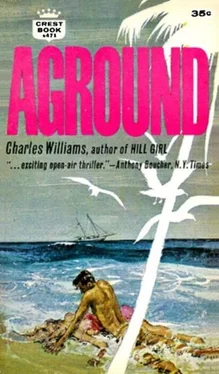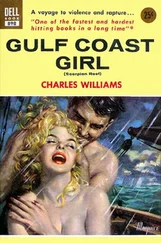“I understand. What shall I do?”
The schooner creaked as she came up a little in the darkness. “Just listen for Morrison,” he said. “As long as he’s shooting, it’s all right, but the tide’s flooding now and it’ll drive him off that flat pretty soon. If he’s going to try to get aboard it’ll be within the next few hours. Go right up to the corner of the forward deckhouse so you’ll be sure to hear him. The gasoline going overboard will make some noise.”
“Right, Skipper.”
“You’re magnificent. Or did I tell you that?”
“You can be as repetitious as you want. I don’t mind at all. Actually, I’m scared green. You just can’t see it.”
He took her face between his hands. “I’m going to get us out of here.”
“Have I ever doubted it?” she asked. “You might call me a fan. I’ve been watching you in operation for the past—good Lord, has it only been two days?”
“All I’ve done so far is lose.”
“That could be a matter of opinion, Ingram. But, listen—if you expect me to keep my mind on Morrison, we’re going to have to spread out.”
She disappeared into the darkness forward. He went back to the cockpit. There was no way now to tell what time it was, but it must be after one. High tide would be between 4:30 and 5:30; call it four hours from now. Using the power-driven bilge pump was out of the question now, of course, since they couldn’t start the engine, but the hand pump would empty it easily in less than an hour and still take care of any water that might seep in through Morrison’s bullet holes. It was on the narrow bridge deck between the cockpit and the break of the deckhouse. He groped around until he found the plate that covered it, grabbed the handle, and began pumping. He could hear the gasoline going over the side in a satisfying stream. Off in the darkness to starboard Morrison’s rifle cracked, but there was no sound of the bullet’s striking the boat. Five minutes went by. The gasoline continued to flow; he’d have it out in a half hour, he thought, the way it was going. Then the handle became harder to raise, and the sound of the stream died to a trickle. It stopped. He cursed, wearily and bitterly, sunk for a moment in utter despair. Damn Tango and his filthy housekeeping. There was no telling what kind of mare’s nest of litter there was in the bilges.
The answer, of course, was simple enough; go down there, locate the suction, and clear it. He thought of it, and shuddered—thought of the dead blackness so impenetrable that directions ceased to have any meaning, of kneeling in gasoline and running his arms down in it while the flaming torch that was Barney Gifford did its frenzied and spasmodic dance along the perimeter of his mind. He mopped sweat from his face. Well, she thinks you’re a grown man; either go down and do it, or go up there and tell her that she’s wrong. It’s all mental, anyway; as long as there’s nothing to set it off, it’s harmless, provided you come up for air before you breathe too much of it. He began taking off his clothes. He put the gun and his watch and sneakers on the seat beside them so he could find them in the darkness, and went down the ladder clad only in his shorts.
At the bottom, he turned and faced aft, visualizing the location of the pump. The cabin sole was dry here, near amidships; the gasoline that had come out of the bilge was out near the bulkhead as she lay over on her side. He could hear it still running out of the tanks, but not as strongly now. Kneeling, he groped around until he found the access hatch, and lifted it out. He started to think of Barney, and the nightmare began to crowd in around the edge of his mind. He pushed it back and concentrated coldly on the job. The fumes were choking him; it was time to go up for air. He went up the ladder until his head and shoulders were out of the hatch, breathed deeply for two or three minutes, and returned. Locating the opening, he groped around in the gasoline beneath it, but couldn’t find the bilge pump suction. He stepped down into it, in gasoline up to his knees, knelt down, and felt further aft. There it was. He could feel the soggy mass of papers around it. The fumes were beginning to make him sick now. He pulled the papers out and threw them toward the starboard side of the cabin. Then he became aware that there were more, both on the bottom under his feet and floating free where he had stirred them up with his splashing around. He felt one brush against his hand, caught it, and lifted it out, and from its size and shape he was pretty sure what it was. Somebody had stored cans of food in the bilges without removing the labels.
He swore softly in the darkness, and managed to fish out three more. A bullet tore through the planking with a splintering sound and slapped into the bulkhead somewhere just forward of him. He shuddered, thinking of the electrical circuits, but went on groping. Then it occurred to him that he was doing more harm than good. As long as they were lying on the bottom they probably wouldn’t get into the suction, but he was stirring up more than he was getting out. He climbed back to the cockpit, wiped the gasoline off his legs and arms with the towel, and began pumping. In five minutes the suction was clogged again.
He went down into the blackness and the fumes and the border country of nightmare once more, and was crouched knee-deep in gasoline with his face just above its surface when he froze suddenly and the skin along his back drew tight with the stabbing of a thousand needles. It was a sound, the familiar, homelike throbbing of an electrical appliance nobody ever really listened to—the refrigerator motor. He’d forgotten all about it until now; the thermostat had tripped, and it had come on. He waited for the white and blinding flash of the explosion. Nothing happened. Seconds ticked away. His legs were trembling, but he breathed again, softly, almost tentatively, as though even daring to hope might tip the scales the other way.
There was nothing he could do. He could go forward to the galley and disconnect it, but breaking the circuit while there was a load on it would cause a spark. None of the switches or electrical fittings aboard were vapor-proof. He went on waiting. A full minute must have gone by now. Maybe the fumes weren’t as dense up there, since the bulk of the gasoline was aft. Strength began to return to his legs and arms, and his mind cleared sufficiently to warn him of the other and ever-present danger—asphyxiation. He hurriedly cleared the pump suction and went back up the ladder. The motor was still humming its industrious way along the edge of eternity.
He caught the pump handle, and for a second he was conscious of a crazy impulse to laugh and wondered if he’d begun to crack. Even this simple act of pumping the stuff overboard could blow it up; the friction of the gasoline against the walls of the pipe and against the air and the water as it fell over the side into the sea generated enough static electricity to set it off. Except for the saving grace of the almost saturated humidity around them, they’d probably be dead already. He went on pumping. After a while you get numb, he thought; you can’t absorb any more, so it rolls off. This time it was nearly ten minutes before the pump clogged. As the trickle died and silence closed over the boat once more, he became aware that the refrigerator motor had cut out. He went below, groped his way forward, and pulled out the plug. He cleared the suction, and returned to the pump. In less than two minutes it choked off again. He went below and cleared it. When he came back he vomited over the side and his skin was inflamed and itching from immersion in the gasoline. He pumped. It was scarcely twenty strokes before the stream died to a trickle and quit. He sat down on the cockpit seat.
Читать дальше












